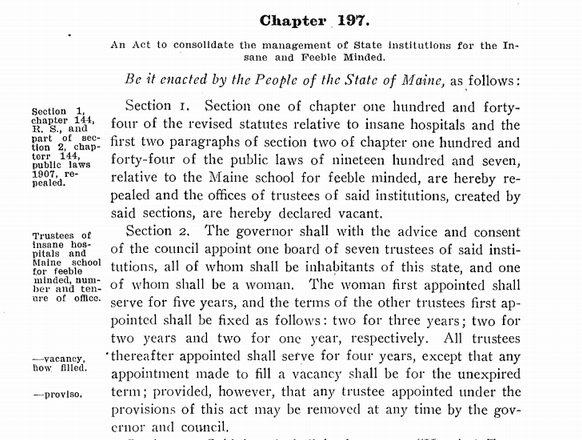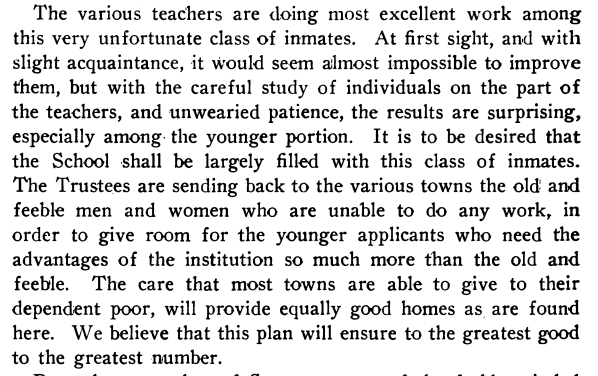In 1909, power was given to judges of probate to commit any they deemed appropriate to the now-labeled School for the Feeble Minded:
![Chapter 167 of the Public Laws of the State of Maine as Passed by the 74th Legislature, 1909 1909 Public Law, Chapter 167: Sidebar: Judge of probate may commit to school for feeble minded. Main Body: Section 5: Whenever it is made to appear, upon application to the judge of probate for any county and after due notice and a proper hearing, that any person resident in said county, or any inmate to the Maine Industrial School for girls, the State School for Boys, the Bath Military and Naval Orphan Asylum, or any person supported by any town, is a fit subject for the Maine School for Feeble Minded, such judge may commit such person to said school by an order of commitment directed to the trustees of said School for Feeble Minded accompanied by a certificate of two physicians who are graduates of some legally organized medical college and have practiced three years in this state, that such a person is a proper subject for said institution. Whenever, upon such application [cut off]…](http://shadowsofpineland.org/wp-content/uploads/2021/07/1909-Public-Law-Ch-167.png)
In 1911, the Legislature established a Board of Trustees to oversee the School, as well as the “insane hospitals” in Augusta and Bangor:

In 1913, the Trustees of the School reported to the Legislature on the “most excellent work” being accomplished at the fledgling institution, despite great needs for better infrastructure and more funding to increase the population of residents – calls that would continue throughout the next 93 years. Their report demonstrates the thinking around working with people with developmental disabilities – that the goal was to make those that could be into capable and productive workers, while those that could not rise to that measure were an afterthought.

By 1914, the State Board of Charities and Corrections, which was the department in the Maine government overseeing the operation of both jails and institutions like Pineland, was echoing calls to expand the School, stating, “A conservative estimate…indicates that the state must plan to care for, altogether, at least 1500 persons of this class.” This report then suggested that “if their number is not to increase faster than the ability of the state to care for them…preference shall be given to females between the ages of 12 and 50 years, who are capable of bearing children.” The call to control the ability of those of “feeble mind” to reproduce would gather steam into the next decades.
In 1914, there were 253 people residing at the School for the Feeble Minded.
In 1915, a law passed to “prevent the aiding or abetting of the escape of inmates of the Maine School for Feeble Minded” placed fines and threats of imprisonment to any that might “knowingly harbor or conceal any one who has escaped” from the school. “Fugitives” from the School could also be arrested and returned.
In 1917, a law was added that allowed transfer of inmates of the two State Juvenile institutions, the State School for Boys and the State School for Girls, if they were “feeble minded” or “after his commitment, becomes feeble minded”:
![Chapter 130 of the Public Laws of the State of Maine as Passed by the 78th Legislature, 1917 Sec. 4. Inmates of either institution may be recommitted to school for feeble minded. Any boy now under the guardianship of the state school for boys, or who may hereafter be committed there, who is feeble minded, or who, after his commitment, becomes feeble minded, or any girl now under the guardianship of the state school for girls, or who may hereafter be committed there, who is feeble minded, or who, after her commitment, becomes feeble minded, may be transferred by the trustees of juvenile institutions, to the Maine School for the Feeble Minded. In such event the trustees of juvenile institutions, by their president or secretary, shall endorse on the original mittimus the fact that the boy or girl is feeble minded, and attach thereto a certificate from a regular practicing physician within the state certifying that the boy or girl is feeble minded, and shall obtain from the superintendent of the said school for the feeble minded a certificate stating in substance that such boy or girl will be received under the provisions of section fifty-one of chapter one hundred and forty-five of the revised statutes. Then upon the delivery of the boy or girl to the officers of the Maine School for the Feeble Minded, together with the original mittimus and certificates herein provided, it shall be the duty of the officers of the Maine School for the Feeble Minded to receive such boy or girl, and thereafter the trustees of juvenile institutions shall cease to have any authority over such boy or girl, and the hospital trustees [cut off]](http://shadowsofpineland.org/wp-content/uploads/2021/07/1917-Public-Law-Ch-130.png)
By 1918, the School for the Feeble Minded had 278 residents.

